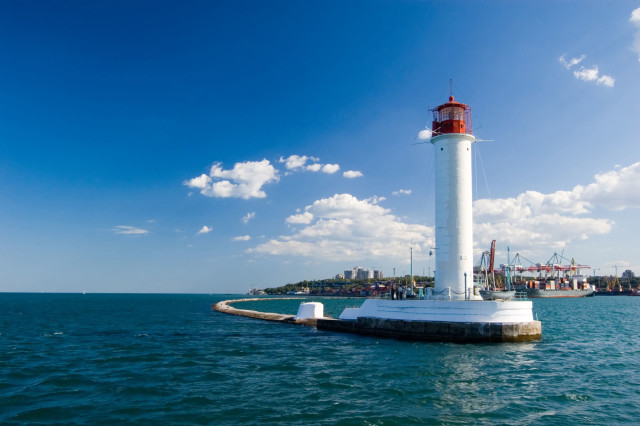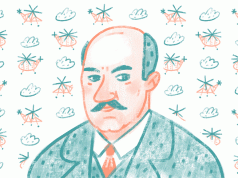In New York you’re always from somewhere else. When people ask me my provenance, I tell them I’m from the South. The South of another country.
In the imagination of anyone who’s ever heard of Odessa, it is a city of sea, sun, boulevards, strolling beauties, life-altering food, color and culture, crime and literature, music and danger – The Pearl by the Sea that richly deserves the moniker. Her sailors are brave, her women headspinningly gorgeous, her gangsters stylish and ruthless, her atrocities particularly horrific. Her most famous musicians – Oistrakh, Milstein, Gilels – world-class and sublime, and the writers – Babel, Ilf & Petrov, Paustovsky, Olesha – all sui generis, the poets of prose, funny and gritty and lyrical and grotesque. The English-language equivalent of the Odessa School would be Southern Gothic, with allowances, naturally, for the city’s neoclassical architecture.
I was brought to Odessa at ten days and taken out of it at eleven years of age. Mine was a charmed childhood in a magical place; I didn’t know what I had until I lost it. Ten years later, I returned – a New Yorker inured to skyscrapers, few to no stray dogs in few to no dilapidated courtyards, and a sense of the world as my oyster. Why, then, from the moment I stepped onto the veined tarmac and smelled the good old leaded fumes of my childhood, did I still see this city as my own Pearl by the Sea? What is it that makes me return, each time surfing a different wave to the same shore? My former life here? The special angle of the sun? The beauty? The squalor?
Speak to anyone who’s given this careful thought over an aperitif at one of the finer establishments on Deribasovskaya, and you’ll learn that Odessa’s paradoxical, enduring appeal, even for a rootless cosmopolitan, goes beyond the predictable rose-colored recollections of a childhood by the sea; that it taps into a profound, generally palpable store of specific energy and gravity – the product of the talent, drive, the thirst for life and the savoir faire of its inhabitants – the accreted greatness that Odessa exudes.
Like Jerusalem, Rome or Istanbul or, for that matter, Cairo, Alexandria or Damascus – Odessa’s got it. It’s a bit of a navel, an omphalos, a center of the world for those who have no choice but to orbit it, a Jerusalem on the shores of the Black Sea. Every Jerusalem has its exile story and its diaspora, and so in the produce-laden bodegas beneath the clatter of the elevated train on Brighton Beach, exposed to the gradient winds blowing through San Francisco harbor, and at practically every point on the compass rose: in unbalmy Chicago and promenade-weary Miami, in wrong-weather Canada and even in Auroville – a speck on the map in southeastern India, where 2 200 neo-hermits built their own city, complete with quality cafés and a world-class non-denominational temple – one finds the faithful denizens of The Pearl by the Sea gravitating toward each other, creating community, telling jokes and somehow managing, as ever, to collectively lighten the individual load.
Indeed, to many, Odessa is a byword for a state of mind, the same way Jewish mystics of an ecumenical bent say Jewishness is a state of mind. One could even argue that there is an Odessa-space out there that’s time- and location-agnostic. In the minds of the city’s most ardent apologists, in contrast to the flat, Euclidian planes of the wider world, Odessa-space is, in the manner of non-Euclidian geometries, hyperbolic and elliptical, which is to say: exaggerating and oracular, larger-than-life and cryptic, out-of-this-world and G-d-only-knows.
It’s a state people aspire to – so much so that when I tell Russian speakers anywhere on Earth that I’m from Odessa, they rush to establish urban cred by recollecting that seaside vacation of thirty years’ vintage or impressing me with an Odessa joke, told – in an instance of well-meaning cultural blackface – in amateurish hyperbole of what they believe Odessa speech to be. In short, it’s a club and a cult, and people want to belong.
But, oh, you’ll find detractors aplenty. The Odessa old guard who didn’t leave even in the 80s, when everyone left, and the grumpy old men from Brooklyn who did leave and now visit once a year, spending half an August day next to you at that outdoor café on Deribasovskaya, ogling the women, intoning the old refrain: Odessa ain’t what it used to be. Hordes of barbarians from the outskirts have invaded. And where is the quality of the laughs, the level of color we had a generation ago? They lament. They are exasperated. All the construction is in the wrong places, and none of the roads are any good. The people are gone, the flavor is stale, even the shadows the plane trees cast on the cobblestones aren’t quite what they were. The tomatoes, too, aren’t beefy or salty or sweet enough. And when the tomatoes go… well, it’s curtains for the whole city. Somehow, though, some of us aren’t convinced. We’ve heard it all before. Somehow we’re sure that the place will pull through, guided by the playful strictness of the architecture, buttressed by its eternal pluck, inspired by its record of overcoming war, famine, pestilence, and human folly.
Life in a city that’s mothered so many great writers follows a certain literary logic, and there is, to be sure, a narrative magic to the lives of Odessa’s inhabitants. It’s as if the local air were constantly condensing a film atop the visible reality, making it that much more cinematic. To truly belong, you must live the dangerous dream, undertake the risk-laden journey, dive headlong into an ever-moving picture. The boon is this: once lived, this alternate reality is yours for the taking, anywhere you go. The great violinist Isaac Stern (for once, someone not from Odessa) distilled the essence of U.S.-Soviet cultural exchange thus: “They send us their Jews from Odessa, and we send them our Jews from Odessa”.
Try though The Big Apple might have to take the Odessa out of me, somehow, despite the distance, the passage of time, the shifts in worldview and demographics, Odessa The Great Enchantress has never left me. Instead, she’s suffused me with the languorous glow of mother-of-pearl childhood memories, won me over time and again with the sage resilience encoded in her inimitable, indefatigable humor, and – through the embarrassment of riches that is her literary, musical, and attitudinal heritage – has resonated within me with the very credo so often attributed to New Yorkers: the stark conviction that anyone who chooses to be anywhere else has got to be, in some sense, kidding.




































